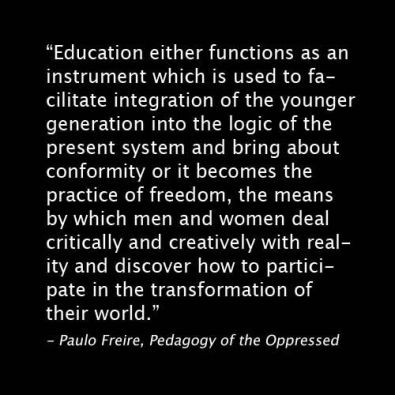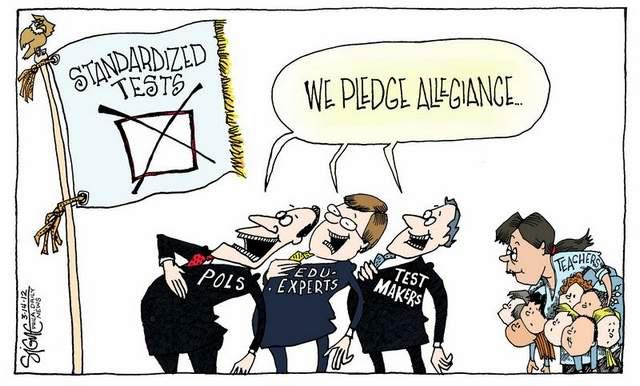This week’s discussion on Critical Pedagogy comes at a very tumultuous time — the election of a new President and his appointed governmental leaders means significant changes are upon us. The American Education System is one of the first sectors facing serious reform. Secretary of Education, Betsy DeVos, looks to overhaul the current public education system by shifting to a more privatized system. DeVos reform plan is being met with plenty of opposition from politicians, teachers, and parents alike despite evidence that many public schools are failing and Federal attempts to improve them have yielded no meaningful success. Now, I’m not going to sit here and tell you DeVos’s plan will completely fix all the problems with our education system, but I want to look at the situation with regards to critical pedagogy and how the American Education System came to be in its current state.
Critical pedagogy has been defined as a philosophy of education (and social movement) that has developed and applied concepts of critical theory and related traditions to the field of education. Critical pedagogy advocates teaching as inherently political, rejecting the neutrality of knowledge, and the belief that issues of social justice and democracy are related to the teaching/learning process. The concept of critical pedagogy can be traced back to Paulo Freire’s best-known 1968 work, The Pedagogy of the Oppressed, in which Freire provides a detailed Marxist class analysis in his exploration of the relationship between the colonizer and the colonized as it pertains to education.
Let’s take a quick look at the American Education System. Government-supported and free public schools were established after the American Revolution. However, education was optional and mostly offered at private local institutions or performed at home. This meant that education was not standardized nor was quality education available to everyone. In 1852, Massachusetts was the first U.S. state to pass a contemporary universal public education law requiring every town to create and operate a grammar school. Fines were imposed on parents who did not send their children to school, and the government had the power to take children away from their parents and apprentice them to others if government officials decided that the parents were “unfit to have the children educated properly”. Laws requiring compulsory education spread and now, virtually all states have mandates for when children must begin school and how old they must be before dropping out. Compulsory education laws require children to attend a public or state-accredited private school for a certain period of time with certain exceptions, most notably homeschooling.
Now that we’ve gotten some of the important background information out of the way, let’s discuss how America’s compulsory education laws have created this colonizer-colonized relationship Freire outlines in The Pedagogy of the Oppressed. By mandating that all children be educated, the Federal government was now responsible for providing a national educational system that was accessible to everyone. This meant that they now have control over the quality and type of content being disseminated to students. Though the public education system was meant to provide everyone with the same educational opportunities, it has furthur exacerbated the educational gap between people of different racial and socio-economic backgrounds.
There is a growing body of evidence showing that the U.S. public education system does not provide the same quality of education to all students. Additionally, similar research shows that U.S. student academic achievement is falling behind that of other countries. Much of this is attributed to the poor quality of education provided by the public school system. Now, there are many quality public schools that provide high-quality education but, unfortunately, they are normally found in areas of economic prosperity. Areas of economic disparity, arguably areas where quality education is most desperately needed, tend to have poor public school systems whose students often fail to meet Federally set academic standards. A factor that furthers this issue is the fact citizens are required to pay taxes supporting the local public schools. For low-income citizens, this means the portion of their income that could have been spent on sending their children to a private or charter school is forcibly invested in public schools. By forcing parents to send their students to school, as well as pay taxes to local public schools, the Federal government is essentially dictating how certain populations will be educated. In the case of those living in low-income areas, they are forced to send their children to the affordable, yet poorer quality, public schools instead of sending them to private or charter schools that may offer a better educational experience.
As it stands, it appears the American Educational System promotes this “colonizer-colonized” relationship, outlined by Freire, which oppresses students via banking education. If we are to free students from this oppression with respect to critical pedagogy, maybe DeVos’s reform plan holds some promise? By expanding the options available to families seeking a better education for their kids, parents will have the opportunity send their children to schools offering the best education. Ideally, this will create competition among schools, encouraging them to improve the quality of education they offer. It doesn’t necessarily force students out of public schools, but stimulates the schools to improve while at the same time giving families options if they don’t. It really raises the question on whether continued support of public schools creates opportunity or fosters oppression.



I was left thinking whether “if we are to free students from this oppression with respect to critical pedagogy,” points to an accumulated debt due to paying tuition for education. There is an economic system in place and money is the currency. I would argue that supporting public schools creates opportunities for the students and fosters an economic “oppression” to belong in the current system and bear responsibilities planned by those in power. It is not one or the other. For an analogy: a person starts working in the kitchen of a restaurant preparing ingredients. They (he or she) observe and learn how to cook. When they have learned enough they might choose to start their own business, or they might remain at the same restaurant and climb up to being a chef. The systemic conditions of our socioeconomic systems will be present to both choices, but the opportunity to start a new business was given by the same system that “oppresses” our person. Space “oppress” us down to earth, but we want to go to Mars!:) – http://www.mars-one.com/
LikeLike
Generally, I like the freedom to choose–my insurance and health care providers, where I live, who I partner with. But when it comes to k-12 education, I think that school “choice” by voucher is a cop out. Transferring public money to private schools increases racial and financial segregation and leaves those who cannot flee poor schools in ailing schools which have been further stripped of resources. I believe that most data indicate students who attend private schools perform no better on standardized measures of learning then similar students in public schools. The US has a long history of both legal and later defacto school segregation and segregation correlates with greater gaps in learning between the powerful and the oppressed. A large part of school funding comes from property taxes. Who do you think gets to attend better schools? More money provides nicer facilities, higher teacher salaries (multiple applicants per opening versus none), and more school funded educational opportunities (sports, music, drama, trips, speakers). Instead of looking ringing alarm bells about our failing schools and then using the alarm to shift public services into the for-profit sector, we need to change school funding practices.
On segregation and achievement gaps:
https://www.washingtonpost.com/posteverything/wp/2015/10/23/forced-busing-didnt-fail-desegregation-is-the-best-way-to-improve-our-schools/?utm_term=.f3582988dafa
AND
https://tcf.org/content/commentary/private-school-vouchers-exacerbate-school-segregation/
On existing school voucher programs:
http://www.greatschools.org/gk/articles/school-vouchers/
On Betsy Devos (Rolling Stone, take with a few grains of salt, but worth reading if only to investigate some of the topics further):
http://www.rollingstone.com/politics/features/trump-education-secretary-betsy-devos-a-win-for-the-christian-right-w470605
LikeLike
Wow, Elizabeth! I did not mean to sound so militant in my reply! Thank you for bringing up this subject about which I am obviously passionate. I wonder if I am listening as well as I should.
LikeLike
You’ve given me lots to think about here, Elizabeth. I will confess to being a staunch advocate of public schools, and am confident that Freire would cringe at the prospect that his ideas were being used to support the kinds of reforms DeVos proposes. The concepts of citizenship and literacy have always been closely connected and public education emerged to make the privileges of citizenship accessible to more people. But Freire would also be concerned about the aspects of the “banking model” of education that pervade in our public schools.
LikeLike
Thank you for sharing! I’m not sure I agree with the idea of cutting support for public schools as a means to increase the quality of education by increasing competition among schools. I think this would further divide the population by keeping the best opportunities exclusively for those from high socio-economic backgrounds and removing access to quality education for the underprivileged populations. I would argue that the problem with the U.S. educational system is more related to the “value” placed on education. Asian and European countries where education is highly regarded and teachers are respected and valued, tend to score higher on PISA (Programme for International Student Assessment) tests. Being a teacher is a highly regarded profession in these countries and educators are remunerated according to the value placed on the educational system. Here is a link to an article on this: https://www.theguardian.com/teacher-network/teacher-blog/2014/sep/05/how-the-job-of-a-teacher-compares-around-the-world
LikeLike
Very good point about the value of education! I wonder how our system would look if education was truly championed as something of value rather than something people are “forced” to do whether they see the value in it or not.
LikeLike
Like many of you all, I do find MANY faults in DeVos plans. I do believe there should be funding for public schools, but I also believe that something needs to be done about the current state of affairs in the public school system. Freire’s piece really made me sit down and try to understand DeVos plans from another angle. I still am not convinced her plan is entirely benevolent or if her proposed changes will ultimately be in the best interest of students. However, I do see how the public school system can offer both opportunity and oppression.
LikeLike
Pingback: Liberation Theology: Part 2 - Kaleoscope